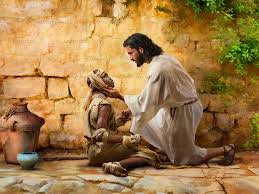HOMILY SUNDAY 06 – B
Living in Faith and Freedom
(Leviticus 13:1-2, 45-46; Psalm 32; 1 Cor 10:23-11.1; Mark 1:40-45)
****************************************************************
Some years ago, there was an item in the news about a nurse who was very upset towards the government. She had returned from tending to those suffering from Ebola in Africa, and although she tested negative for the disease, she was required to be quarantined for twenty-one days anyway. Basically, she was treated like a leper at the time of Jesus – isolated, separated, unable to interact with anyone personally. Today, most of us can identify with her, kept apart as we are by the Covid – 19 pandemic.
Strong, humble faith, like that of today’s leper in the Gospel, and that of St. Paul in the second reading, can free us from our own form of leprosy, our own spiritual disease of sin and sinfulness.
At the time of Jesus, leprosy was a terrible and frightful disease, very much akin to the disease of Ebola and Covid – 19 in our own time. Hospitals at that time had two wards; one for leprosy (where all kinds of skin diseases were put) and the ordinary ward. Moreover, lepers were isolated, living near dumps, considered human garbage. The leper was unclean, had to live alone, marginalized, outside the community. We see that teaching in the first reading from Exodus, where all Moses and Aaron and Old Testament theology could do was to try to contain the disease by marginalizing and quarantining lepers; they could not heal as they were still under the curse of Adam and needed a saviour.
 The leper who approaches Jesus in the Gospel was humble, kneeling before Jesus and begging him to heal him. He also had great faith in Jesus, saying, “If you choose, you can heal me.” And Jesus, out of compassion, touches him and heals him. In coming near the leper and touching him, Jesus broke all the boundaries around the disease and went beyond the Law, showing his authority over the Law as the Son of God. At the same time, Jesus is careful to observe the Law, in sending him off to show the priests and make the prescribed offering for his healing. Jesus has come to fulfill the Law, not abolish it. The leper then goes out and proclaims to everyone what Jesus has done, a great example for us.
The leper who approaches Jesus in the Gospel was humble, kneeling before Jesus and begging him to heal him. He also had great faith in Jesus, saying, “If you choose, you can heal me.” And Jesus, out of compassion, touches him and heals him. In coming near the leper and touching him, Jesus broke all the boundaries around the disease and went beyond the Law, showing his authority over the Law as the Son of God. At the same time, Jesus is careful to observe the Law, in sending him off to show the priests and make the prescribed offering for his healing. Jesus has come to fulfill the Law, not abolish it. The leper then goes out and proclaims to everyone what Jesus has done, a great example for us.
At the end of this Gospel passage, Mark is careful to note that Jesus himself then becomes the outcast. His reputation has spread so much that he cannot come into the communities, and suffers the fate of the leper. That is what Jesus does for us – he goes to the end to take on our woundedness and our sin, to forgive and to heal. We all have our own wounds and losses. Perhaps like the leper these set us apart, unable to truly live peacefully with others. Like the leper, we can always come to Jesus for that forgiveness and healing.
In the second reading, St. Paul picks up the theme of the effects of the Law, and points out the limits of the Law. He rejoices in his freedom from the constraints of the Law. Still, he seeks the good of the other and can set aside his privilege for the good of the other. In the end, we are to do all for the glory of God. What is significant here is that Paul is so rooted in his faith and love that he can ask his readers to imitate him. That can and should be our goal also – to live in such a way that we could encourage others to imitate us.
Young Bobby went to the pound to buy a dog. He was attracted to a puppy that was missing one leg. Despite the protests from the owner that this dog would be useless, the little boy insisted that puppy was the one he wanted. When the owner of the pound asked him why he would want that one when there were so many others in good shape, the boy raised his pant leg to reveal a prosthesis and said simply that the dog and he would be good for each other. In a way, in this story, we are the little boy with the prosthesis, and Jesus is the dog who goes to all lengths to identify with us, gives his all to save us, and heals us.
The Eucharist that we celebrate today is an event that overcomes the effects of leprosy. It unites us and brings us closer to each other. Here, no one is above or below anyone else. Rich or poor, famous or unknown, pauper or prince, we are all equal at this table and welcome in this house.
May our celebration today strengthen our faith in the power of Jesus to forgive and heal us physically, mentally, emotionally and spiritually. May it empower us to be like St. Paul, so rooted in faith and love that we could invite others to imitate us.



